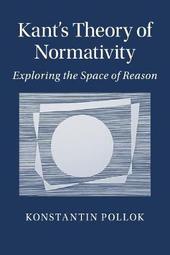
|
Kant's Theory of Normativity: Exploring the Space of Reason
Paperback / softback
Main Details
Description
Konstantin Pollok offers the first book-length analysis of Kant's theory of normativity that covers foundational issues in theoretical and practical philosophy as well as aesthetics. Interpreting Kant's 'critical turn' as a normative turn, he argues that Kant's theory of normativity is both original and radical: it departs from the perfectionist ideal of early modern rationalism, and arrives at an unprecedented framework of synthetic a priori principles that determine the validity of our judgments. Pollok examines the hylomorphism in Kant's theory of normativity and relates Kant's idea of our reason's self-legislation to the 'natural right' tradition, revealing Kant's debt to his predecessors as well as his relevance to contemporary debates on normativity. This book will appeal to academic researchers and advanced students of Kant, early modern philosophy and intellectual history.
Author Biography
Konstantin Pollok is Professor of Philosophy at the University of South Carolina. He is the author of Kants Metaphysische Anfangsgrunde der Naturwissenschaft: Ein Kritischer Kommentar (2001) and Begrunden und Rechtfertigen: Eine Untersuchung zum Verhaltnis zwischen rationalen Erfordernissen und pravalenten Handlungsgrunden (2009).
Reviews'Pollok's book deserves close engagement; it is ... uncommonly demanding, but it is also uncommonly rich.' Yoon H. Choi, Notre Dame Philosophical Review '... readers will appreciate Pollok's well-researched account of the unity of the critical philosophy and his explanation of how, on Kant's view, we can be bound by norms. It is an important piece of Kant scholarship.' Matthew C. Altman, Journal of the History of Philosophy 'Kant's Theory of Normativity is a fascinating, outstandingly structured and extensive research into the core of Kant's critical philosophy. Its all-encompassing perspective not only casts light on different problematic aspects of Kant's thought but, most importantly, lets the reader realize how these different aspects are all traceable back to reason's attempt to self-legislate its own demands.' Luigi Filieri, Studi Kantiani
|